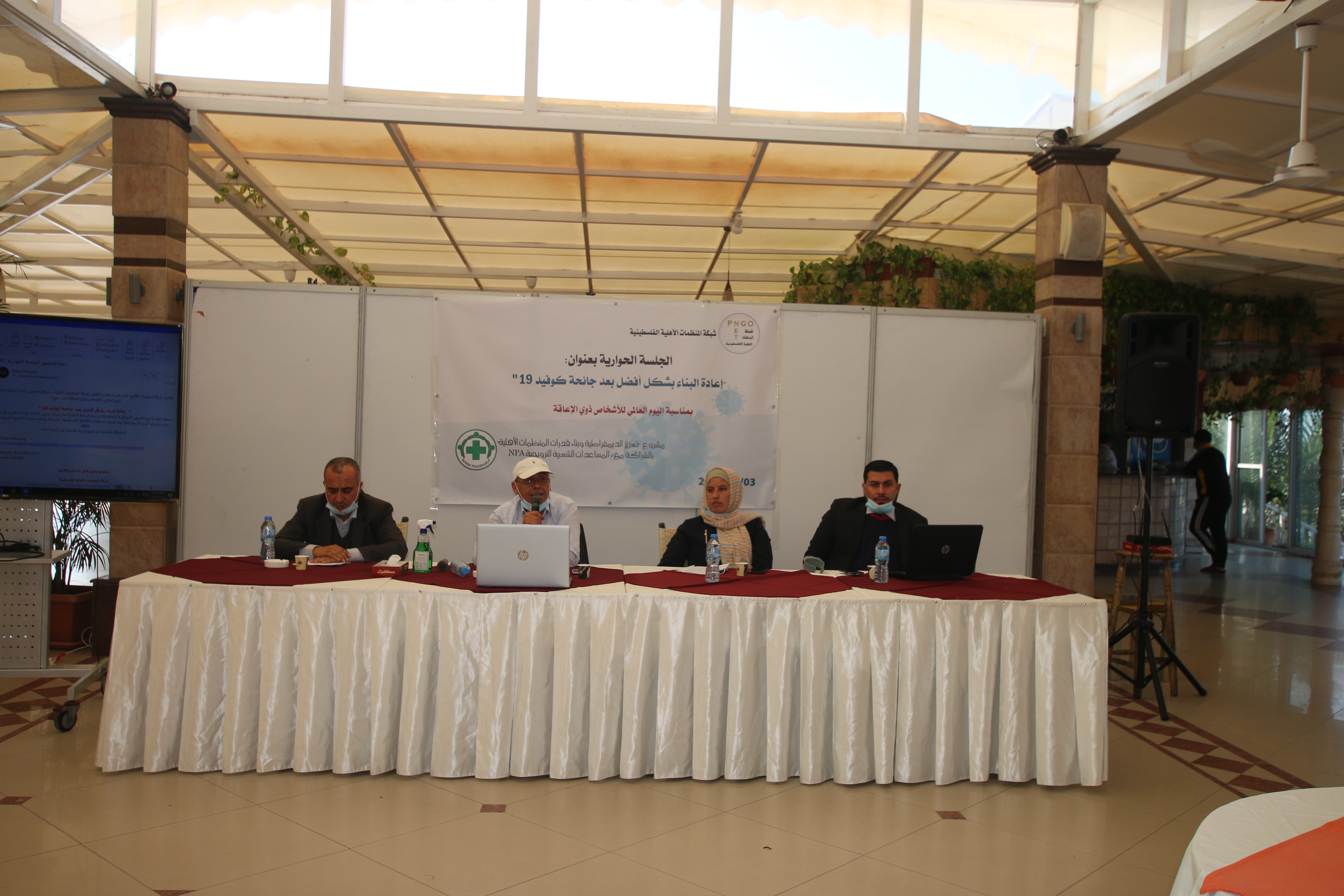Persons with disabilities, officials, and NGO activists demanded the government to issue cards to PWDs as a part of enforcing the law that provides the necessary services for them.
This came during a dialogue session held by PNGO and its Rehabilitation Sector aimed at the occasion of International Day of Persons with Disabilities as a part of the, "Promoting Democracy and Building the Capacity of Civil Society Organizations" project, which is implemented in partnership with the Norwegian People's Aid (NPA).
The attendees criticized the failure of the authorities in the West Bank and Gaza Strip to issue PWDs cards to be among the steps that guarantee a decent life followed by essential rights for them.
They stressed that persons with disabilities rehabilitation institutions and civil society organizations will not wait long for the card to be approved as they will pressure all parties, including the government.
Jamal Al-Razi, PNGO rehabilitation sector coordinator, moderated the session where tens of activists participated through Zoom.
Zarif Al-Ghurra, persons with disabilities body network coordinator, and Latifa Al-Jabari, Protection Project at the Stars of Hope Association coordinator, presented two papers during the workshop as well as Mustafa Abdel Wahab, director of the Association of the Physically Handicapped, read PWD statement at the end of the workshop.
In his speech, Al-Ghurra indicated that the Ministry of Social Development provides health services packages, social, professional, and educational integration, rehabilitation, and support services related to the type and degree of disability through the card.
Al-Ghurra continued to mention the importance of the card and the service packages as they meet the needs of people with disabilities, noting that 80 percent of them live below the poverty line.
He pointed out, the cards are divided according to the law into three classifications and the colours. The yellow colour gives its holders the right to access all services with complete exemption from all types of fees. The green gives its holders the right to obtain services with an exemption of 40 percent from all types of fees. The purple gives its holders the right to obtain services with an exemption rate of 70 percent.
Al-Ghurra explained that the services provided through the card include social security as a right for all persons with disabilities. Adult PWDs receive financial and in-kind allowances to ensure a dignified life, by ensuring that they receive a minimum of cash income.
The cards also include the right to free health insurance for every person with disabilities, he added, whether a child or adult and male or female. They also assure the right to obtain assistive tools of all kinds, whether medical consumables or others, as well as education services for all children with disabilities and their inclusion in the overall education system.
Al-Ghurra said that the card also includes providing employment services as well as permanent jobs related to the nature of their disability and specializations. In other words, including at least 5 percent of government and private jobs in civil society organizations for PWDs.
In turn, Al-Jabari spoke about the reality of persons with disabilities and the challenges that women with disabilities face, especially within the Coronavirus conditions.
Al-Jabari called for ensuring the participation of people with disabilities, taking into account the participation of women with disabilities in planning processes and meeting needs, making websites easy to access for a good-quality education, and providing technical and financial support to the families of PWDs by either governmental bodies or civil society organizations.
Moreover, Al-Jabari stressed the need to raise awareness by Braille and sign language leaflets alongside adding sign language translation to all videos clearly and understandably.
She also called for the allocation of a free phone line to all citizens, with a video call option for people with a hearing disability. Adding to that, Al-Jabari suggested making a complaints box to take PwDs' opinions seriously.
There must be a need to take into account gender sensitivity at the governmental and institutional level to prevent harassment and harassment of women in general, and women with disabilities in particular, Al-Jabari said.
In the same context, she indicated the importance of having a clear media platform for service providers and beneficiaries to learn about the services provided and their locations in various ways.
For his part, Abdel-Wahab read a statement issued by the PNGO rehabilitation sector, in which he called for providing health needs, safety and precaution measures for people with disabilities to face the COVID pandemic and to facilitate their access to services.
The statement also called for work to stop the violations of the Israeli occupation authorities against persons with disabilities the barbaric killing of civilians as well as lifting the siege on the Gaza Strip to provide health and educational rehabilitation services.
Furthermore, the Palestinian government must work to harmonize local law according to the needs of persons with disabilities, improve access to work, treatment, and education, and create a safe and friendly environment for them, especially within COVID-19 reality. Also, the Palestinian government must legally pursue Israeli authorities through international human rights institutions.
The Palestinian executive, legislative and judicial authorities must bear the responsibility of Persons with Disabilities by implementing all International Conventions terms as well as harmonizing the Palestinian laws and procedures to comply with the needs of PWDs and inviting international institutions and donors to increase funding for PWD rehabilitation institutions to enhance their services.
Al-Razi said at the beginning of the session that the successive Palestinian governments since the establishment of the Palestinian National Authority have stalled the enforcement of PWDs rights despite Palestine's agreement to the International Convention on the Rights of Persons with Disabilities.
He stressed the importance of approving the card of persons with disabilities and providing them with all necessary services, indicating that civil society organizations play a greater role in providing these services.




